

The 1970 British Cohort Study (BCS70) is following the lives of around 17,000 people born in England, Scotland and Wales in a single week of 1970.
What’s in the study?
Over the course of cohort members’ lives, BCS70 has collected information on health, physical, educational and social development, and economic circumstances among other factors.
BCS70 has become a vital source of evidence on key policy areas such as social mobility, education, training and employment, and economic insecurity.
What has the study found?
This invaluable study has resulted in important findings at each stage of life.
Research based on BCS70 has shown the importance of reading for pleasure for children’s cognitive development, especially in vocabulary and spelling, but also in maths.
Findings from the cohort members’ school years continue to inform the education debates of today. The study has revealed that grammar schools have been no more successful than comprehensives at helping to ensure pupils gained a university degree.
Today, research using BCS70 has shown a strong link between childhood disadvantage and adult mental wellbeing for this generation.
Who funds the study?
BCS70 is core funded by the Economic and Social Research Council. The most recent sweep, at age 46, received additional funding from the Medical Research Council and and the British Heart Foundation.




 Our studies
Our studies









